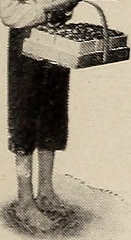It can be confusing trying to figure out which fruits and vegetables last longer if left on the countertop versus being kept in the refrigerator. A constant problem with buying produce is having to throw it away after a few days due to it becoming brown, wilted, or rotten.
Always keep your fruits and vegetables in the crisper part of the refrigerator. The food loses its moisture a lot slower in there than any other part of the ice box.
Some fruits and vegetables such as carrots and apples store better in paper bags. Not all fruits and vegetables are the same, however, so never try this with a fruit such as a kiwi fruit.
Never store tomatoes in the refrigerator, instead keep them away from sunlight at room temperature. They will not only lose their flavor in the fridge, but they will also turn mushy a lot sooner if placed in there.
Keep your produce in perforated plastic bags. This will also help preserve the freshness in the refrigerator.
If you wash your fruit or vegetables before storing, always make sure that they are entirely dry before putting them away. Moisture can add to early spoilage.
Perhaps the best way to avoid spoiled fruits and vegetables is to only buy the amount that you can eat. Most people tend to buy more than they are going to eat.
Examine the amount you are buying and really think about whether or not you will eat them. The following vegetables that should be stored in the ice box’s produce drawers are carrots, celery, leafy greens, green onions, peas, radishes, cucumbers, corn, baggage, broccoli, beets, beans artichokes, and asparagus.
The produce drawers in your refrigerator have a higher moisture level which helps keep fruits and vegetables stay fresh. Fruits that should be kept in the crisper drawers are berries, cherries, grapes, and citrus fruit.
Consider keeping your fruits and vegetables in perforated plastic bags as they are designed to retain moisture, extending the life of the greens. Produce that can be stored in a bowl on the countertop are bananas, citrus fruits, mangoes, papayas, pomegranates, watermelon, pineapple, eggplant, peppers, pumpkins, and tomatoes.
Fruits that can be left on the countertop until they are ripe or after a week are apples, avocados, kiwifruit, peaches, plums, pears, and nectarines. Once these fruits are ripe or kept out for just under a week, move them into the refrigerator.
When leaving produce out on your countertop, make sure it is in a spot where there is enough air circulation. Keep countertop produce away from sunlight.
Greens that can be stored in the pantry are potatoes, garlic, onions, shallots, and winter squashes. Make sure any items stored in the pantry are kept away from sunlight but still have decent ventilation.
To help you remember which produce to store where, make a list of items separated into columns labeled ice box, countertop, and pantry. Leave room at the bottom to add additional types of produce.
You can even ask the clerk at your grocery store for advice on storage. Keeping fruits and vegetables fresh is a challenge.
Plastic bag packaging provides a convenient way to purchase and transport groceries but is not best way to store them in the refrigerator or pantry. Remove lettuce, spinach and herbs from plastic grocery store packaging.
Wash and spin-dry the leaves. Wrap the dried leaves in a paper towel or dry dish towel and refrigerate.
Salad greens may also be stored in a food saving vacuum packaging canister. Store peeled carrots and celery sticks in water-filled, sealed plastic container in the ice box.
Remove potatoes and onions from plastic bags and store in a cool, dark pantry box lined with paper towels. Keep garlic bulbs cool, dry and in the dark.
Peel garlic cloves and store in olive oil in the refrigerator. Remove grapes from the stems, wash and spin-dry, then place on a paper towel or dry dish towel in a plastic container and store in the ice box.
Use a reusable food saver to absorb moisture and ethylene gas. Ethylene gas speeds up the ripening of produce.
Store the reusable package in the ice box crisper bin. Some produce bags absorb moisture and ethylene gas.
Jack R. Landry is an accomplished expert in family preparedness and has been giving seminars for over 15 years. He recommends that everyone have on hand an Emergency Food Supply in case of any emergency or disaster.
Contact Info:
Jack R. Landry
JackRLandry@gmail.com
http://www.foodinsurance.com

